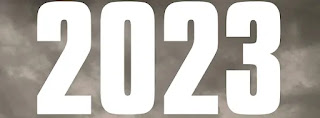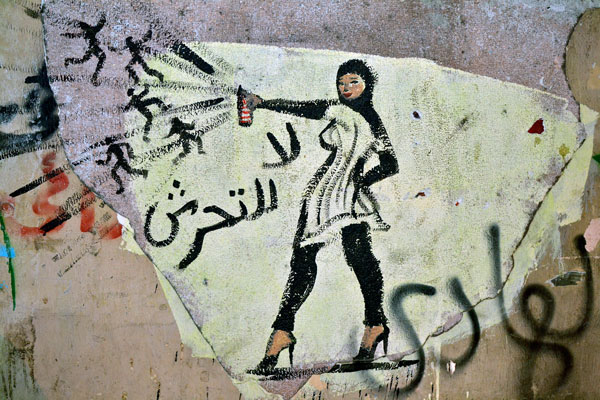Home
Posts filed under egypt
إظهار الرسائل ذات التسميات egypt. إظهار كافة الرسائل
إظهار الرسائل ذات التسميات egypt. إظهار كافة الرسائل
12/28/2022
1/12/2020
10/30/2017
UBER VESPA Uber, Careem in smart transportation
NEW APP LETS YOU BOOK A 'VESPA' FOR YOUR NEXT RIDE
Uber, Careem in smart transportation
Cairo traffic is no joke; research by the World Bank shows that the capital's congestion problem costs Egypt a whopping EGP 50 billion per year, with too many cars and not enough trains or buses, for the millions of desperate workers to commute every day. But what about motorcycles? The question set entrepreneur Mohamed Salah off on a quest.
His app, aptly named Vesba, is similar to car booking applications such as Uber and Careem, except their vehicles are Vespas and scooters. The app, which was released on July 1st, is currently in its beta phase and only available for Android on the Google Play Store and aims to provide a faster, cheaper alternative transportation.
In an intervew with Startup Scene, Salah explains what gave him the idea for the innovative app and his plans for expansion. “Last winter I worked in Smart Village. I live in Dokki, and I used to have to make the trip to and from the village every day. Traffic was always really bad on the way home, and it got me wondering, why isn’t there a faster way for me to commute than cars and public transportation? That's how I got the idea for Vesba.”
It wasn’t until the recent increase in gas prices that Salah decided it was time to make his idea a reality. “I asked around and found out that Vespas and scooters use much less gas than cars do, making them a much cheaper mode of transportation. And they are perfect for someone who commutes alone, like I used to.”
The fare of the app relies on the following:
- Trip starts at EGP 3.
- Price per km costs EGP 1.1.
- Waiting time is EGP 0.25 per minute.
Vespa announced the conditions for accepting drivers as follows:
- Driver must be between 21 and 35 years old.
- Registration takes place with the driver’s own Vespas. Regular motorbikes are not acceptable, as they provide less safety to riders.
- Drivers must be 70 kgs at most, since the maximum load per Vespa is 150 kgs.
- Vespas must have a backrest and a foot support.
- Vespas must be newer than 2007.
- Drivers must abide by traffic laws and have two helmets, for the driver and rider.
- Vespas must have USB outlets to charge mobile phones.
The app, however, comes with several disadvantages. Women are not eligible for ordering a Vespa through the app. The natural method of the passenger sitting behind the driver will force them to embrace the driver from the back—which does not commensurate with norms and public traditions. The company has announced its intentions to hire female drivers to facilitate using the app for women.
For more on Vespa, check out their Facebook
10/29/2017
THINGS IN EGYPT THAT ARE SCARIER THAN HALLOWEEN
THINGS IN EGYPT THAT ARE SCARIER THAN HALLOWEEN
There’s a reason Halloween never caught on in Egypt. White people may find zombies, goblins, vampires, and Jerry Springer scary, but we stuff koshary into plastic bags and squeeze it into our mouths and there’s literally nothing scarier. Let’s see if you people can handle our daily horrors.
Tattooed Eyebrows

Miss, you have giant skid marks where your eyebrows should be.
Soccer Moms Driving in Hyundai Matrix
--------
Ma'am, would you mind terribly driving like the gremlins didn't just invade your car (and your mind)?
Applying for a Schengen Visa
So, like, not to call institutional racism bullshit, but this is some institutional racism bullshit.
Being a Cat in Nady El Gezira
we ever get reincarnated as felines in Egypt, we hope we have the good sense not to wander into Gezira Club. Unless, we come back as a panthera felines, in which case we'll be more than happy to give Gezira Club a taste of their own medicine.
Being a Maid in an Upscale Sahel Resort
Hey, Sahel, the 50s called, they want their segregated pools back!
Mogammaa Tahrir

How would you like to claw your way to the clerk's desk while slip 'n sliding in other people's sweat?
Kameen El Zaarafana
Why yes, officer, I do have glaucoma!
She will ruin your life and slut shame you for being sexually harassed, and then she'll celebrate with an awful rendition of Despacito that somehow makes the original sound like a classic masterpiece.
This
10/23/2017
Zabbaleen: Trash Town. A whole community in Egypt that lives on rubbish
Zabbaleen: Trash Town. A whole community in Egypt that lives on rubbish
Tens of thousands of people live in Zabbaleen, on the outskirts of Cairo, Egypt, they all make a living out of recycling the entire capital city’s refuse. Their whole town is practically a giant dump and it provides them with almost everything they need: from kids’ toys to fodder for livestock. Even their pigs play an important part in recycling food waste. Most important of all though, the dump provides livelihoods for the people of Zabbaleen.
Every one of the rubbish collectors plays their own part, gathering, transporting or sorting the rubbish. Collectively, everyone in the community performs a highly efficient job of recycling Cairo’s refuse. This allows the trash town to be self-sufficient and largely independent from the rest of the city. The place has its own rules, everyone is allocated their own patch of Cairo, no one would think of collecting from someone else’s area
Every one of the rubbish collectors plays their own part, gathering, transporting or sorting the rubbish. Collectively, everyone in the community performs a highly efficient job of recycling Cairo’s refuse. This allows the trash town to be self-sufficient and largely independent from the rest of the city. The place has its own rules, everyone is allocated their own patch of Cairo, no one would think of collecting from someone else’s area
9/27/2017
Egypt Economy 2017
الاقتصاد - نظرة عامة:
تحتل مصر الركن الشمالي الشرقي للقارة الأفريقية، تقطع مصر وادي النيل الخصيب للغاية، حيث يحدث معظم النشاط الاقتصادي. كان اقتصاد مصر مركزيا للغاية خلال حكم الرئيس السابق جمال عبد الناصر ولكنه انفتح بشكل كبير تحت رئاسة الرئيسين السابقين أنور السادات ومحمد حسني مبارك من القاهرة في الفترة من 2004 إلى 2008 من أجل إصلاحات مناخ الأعمال لجذب الاستثمارات الأجنبية وتسهيل النمو. إن ظروف المعيشة السيئة وفرص العمل المحدودة لمصر العادي تسهم في السخط العام، وهو عامل رئيسي يؤدي إلى ثورة يناير 2011 التي أطاحت بمبارك. وقد تسببت البيئة السياسية والأمنية والسياسية غير المؤكدة منذ عام 2011 في تباطؤ النمو الاقتصادي بشكل كبير وإلحاق الضرر بالسياحة والصناعة والقطاعات الأخرى، مما أدى إلى ارتفاع معدلات البطالة. وقد أدى ضعف النمو ومحدودية عائدات النقد الأجنبي إلى جعل المالية العامة غير مستدامة، مما جعل السلطات تعتمد على الاقتراض المكلف لتمويل العجز، وحلفاء الخليج للمساعدة في تغطية فاتورة الواردات. وفي عام 2015، ساهمت المستويات األعلى لالستثمار األجنبي في انتعاش طفيف في نمو الناتج المحلي اإلجمالي بعد فترة من الكساد في فترة ما بعد الثورة.
الناتج المحلي الإجمالي (تعادل القوة الشرائية):
$ 1.105 تريليون دولار (2016) 1.064 تريليون دولار أمريكي (2015) 1.021 تريليون دولار أمريكي (2014)
ملاحظة: البيانات هي في عام 2016 دولار
مقارنة البلدان بالعالم: 23
الناتج المحلي الإجمالي (سعر الصرف الرسمي):
342.8 مليار دولار (عام 2015 م)
الناتج المحلي الإجمالي - معدل النمو الحقيقي:
3.8٪ (عام 2016) 4.2٪ (2015 م) 2.2٪ (2014 م)
مقارنة البلدان بالعالم: 65
الناتج المحلي الإجمالي للفرد الواحد:
12،100 دولار (قيمة عام 2016) 12،000 دولار (قيمة عام 2015) 11800 دولار (عام 2014)
ملاحظة: البيانات هي في عام 2016 دولار
مقارنة البلدان بالعالم: 125
إجمالي الادخار الوطني:
8.7٪ من الناتج المحلي الإجمالي (2016) 10.7٪ من الناتج المحلي الإجمالي (2015) 13٪ من الناتج المحلي الإجمالي (2014)
مقارنة البلدان بالعالم: 157
الناتج المحلي الإجمالي - التركيب، حسب الاستخدام النهائي:
الاستهلاك المنزلي: 84.4٪
الاستهلاك الحكومي: 12٪
الاستثمار في رأس المال الثابت: 12.1٪
الاستثمار في المخزونات: 0.4٪
صادرات السلع والخدمات: 12.7٪
واردات السلع والخدمات: -21.6٪ (2016)
الناتج المحلي الإجمالي - التكوين، حسب قطاع المنشأ:
الزراعة: 11.3٪
الصناعة: 35.8٪
سيرفيسز : 52.9٪ (2016 إست.)
الزراعة - المنتجات:
القطن والأرز والذرة والقمح والفاصوليا والفواكه والخضروات. الماشية، جاموس الماء، الأغنام، الماعز
الصناعات:
والمنسوجات، وتجهيز الأغذية، والسياحة، والمواد الكيميائية، والمستحضرات الصيدلانية، والهيدروكربونات، والبناء، والأسمنت، والمعادن، والصناعات الخفيفة
معدل نمو الإنتاج الصناعي:
0.6٪ (2016)
مقارنة البلدان بالعالم: 160
[انظر أيضا: معدلات نمو الإنتاج الصناعي في البلدان ]
القوى العاملة:
31.96 مليون (2016)
مقارنة البلدان بالعالم: 20
القوى العاملة - حسب المهنة:
الزراعة: 29.2٪
[انظر أيضا: القوى العاملة - حسب المهنة - صفوف البلدان الزراعية ]
الصناعة: 23.5٪
سيرفيسز : 47.3٪ (2013 إست.)
معدل البطالة:
13.1٪ (عام 2016) 12.8٪ (2015 م)
مقارنة البلدان بالعالم: 145
السكان الذين يعيشون تحت خط الفقر:
25.2٪ (2011)
دخل الأسرة أو استهلاك النسبة المئوية:
أدنى 10٪: 4٪
أعلى 10٪: 26.6٪ (2008)
توزيع دخل الأسرة - مؤشر جيني:
30.8 (2008) 32.1 (2005)
مقارنة البلدان بالعالم: 116
ميزانية:
الإيرادات: 60.09 مليار دولار
[انظر أيضا: إيرادات الميزانية القطرية ]
النفقات: 92.37 مليار دولار (قيمة عام 2016)
الضرائب والإيرادات الأخرى:
17.5٪ من الناتج المحلي الإجمالي (2016)
مقارنة البلدان بالعالم: 173
فائض الميزانية (+) أو العجز (-):
-9.4٪ من الناتج المحلي الإجمالي (2016)
مقارنة البلدان بالعالم: 199
الدين العام:
92.6٪ من الناتج المحلي الإجمالي (2016) 90.2٪ من الناتج المحلي الإجمالي (2015)
ملاحظة: تغطي البيانات ديون الحكومة المركزية وتشمل أدوات الدين الصادرة (أو المملوكة) من قبل كيانات حكومية بخلاف الخزينة، وديون الخزانة التي تحتفظ بها كيانات أجنبية، والديون الصادرة عن الكيانات دون الوطنية، وكذلك الديون داخل الحكومات؛ داخل الحكم
مقارنة البلدان بالعالم: 18
السنة المالية:
1 تموز / يوليه - 30 حزيران / يونيه
معدل التضخم (أسعار المستهلك):
12.1٪ (2016) 10.4٪ (2015 م)
مقارنة البلدان بالعالم: 209
معدل خصم البنك المركزي:
9.75٪ (30 أكتوبر 2014) 8.75٪ (5 ديسمبر 2013)
مقارنة البلدان بالعالم: 26
البنك التجاري سعر الإقراض الرئيسي:
12.5٪) 31 ديسمرب 2016 (11.63٪) 31 ديسمرب 2015 م
مقارنة البلدان بالعالم: 63
سهم من المال الضيق:
55.96 مليار دولار (31 ديسمبر 2016) 66.49 مليار دولار (31 ديسمبر 2015 م)
مقارنة البلدان بالعالم: 47
مخزون من المال الواسع:
210.8 بليون دولار (31 كانون الأول / ديسمبر 2016) 243.4 بليون دولار (31 كانون الأول / ديسمبر 2015)
مقارنة البلدان بالعالم: 41
مخزون الائتمان المحلي:
260.3 بليون دولار (31 كانون الأول / ديسمبر 2016) 297.4 بليون دولار (31 كانون الأول / ديسمبر 2015)
مقارنة البلدان بالعالم: 39
القيمة السوقية للأسهم المتداولة:
55،19 بليون دولار (31 كانون الأول / ديسمبر 2015) 70،08 بليون دولار (31 كانون الأول / ديسمبر 2014) 61،63 بليون دولار (31 كانون الأول / ديسمبر 2013)
مقارنة البلدان بالعالم: 49
رصيد حسابك الحالي:
- 12.18 مليار دولار (قيمة عام 2015) - 12.18 مليار دولار أمريكي (2015 م)
مقارنة البلدان بالعالم: 181
صادرات:
14.73 مليار دولار (قيمة عام 2016) 19.03 مليار دولار (قيمة عام 2015)
مقارنة البلدان بالعالم: 73
الصادرات - السلع:
والنفط الخام والمنتجات النفطية، والفواكه والخضروات، والقطن، والمنسوجات، والمنتجات المعدنية، والمواد الكيميائية، والأغذية المصنعة
الصادرات - الشركاء:
المملكة العربية السعودية 9.1٪، إيطاليا 7.5٪، تركيا 5.8٪، الإمارات 5.1٪، الولايات المتحدة 5.1٪، المملكة المتحدة 4.4٪، الهند 4.1٪ (2015)
الواردات:
50.07 مليار دولار (عام 2016) 57.17 مليار دولار (قيمة عام 2015)
مقارنة البلدان بالعالم: 48
الواردات - السلع:
والآلات والمعدات، والمواد الغذائية، والمواد الكيميائية، والمنتجات الخشبية، والوقود
الواردات - الشركاء:
الصين٪ 13، ألمانيا 7.7٪، الولايات المتحدة 5.9٪، تركيا 4.5٪، روسيا 4.4٪، إيطاليا 4.4٪، المملكة العربية السعودية 4.1٪ (2015)
احتياطيات النقد الأجنبي والذهب:
15.06 مليار $ (31 ديسمبر 2016) 15.49 مليار $ (31 ديسمبر 2015 إست.)
مقارنة البلدان بالعالم: 64
ديبت - إكسترنال:
50.67 مليار دولار أمريكي (31 ديسمبر 2016) 44.61 مليار دولار أمريكي (31 ديسمبر 2015 م)
مقارنة البلدان بالعالم: 63
مخزون الاستثمار الأجنبي المباشر - في المنزل:
94.51 بليون دولار (31 كانون الأول / ديسمبر 2016) 89.65 بليون دولار (31 كانون الأول / ديسمبر 2015)
مقارنة البلدان بالعالم: 48
مخزون الاستثمار الأجنبي المباشر - في الخارج:
8.042 بليون دولار (31 كانون الأول / ديسمبر 2016) 7.362 بليون دولار (31 كانون الأول / ديسمبر 2015)
مقارنة البلدان بالعالم: 65
معدل التحويل:
جنيه مصري (بالدولار الأمريكي) 9.71 (2016) 7.7133 (2015) 7.7133 (2014) 7.08 (2013) 6.06 (2012)
ملاحظة: يتم إعادة نشر المعلومات المتعلقة بمصر في هذه الصفحة من كتاب الحقائق العالمي لعام 2017 لوكالة المخابرات المركزية الأمريكية. لم يتم تقديم أي مطالبات بشأن دقة معلومات اقتصاد مصر لعام 2017 الواردة هنا. جميع الاقتراحات لتصحيح أي أخطاء حول مصر الاقتصاد 2017 ينبغي أن توجه إلى وكالة المخابرات المركزية.
1/17/2017
Dahab the Paradise on Earth
If you’re searching for relaxation, comfort and pleasure, then look no further than the Red Sea town of Dahab.
Dahab is one of the most beautiful cities in the world with its moderate climate and gushing waves that crawl gently to the shore. People in Dahab are also often described as cheerful and hospitable.
In Dahab, you will find all that you need, ranging from delightful food options to plenty of lifestyle activities. This is complemented by Dahab’s relaxing and comfortable nature which takes you away from the hustle and bustle of major cities such as Cairo.
Below, I look at some of the things I recommend you do in Dahab during your visit.
Must Do Activities in Dahab
Water Sports
Dahab is an ideal place for an aquaphile. From snorkeling and scuba diving, to windsurfing, kitesurfing and much more, water sports and activities are abundantly available across the town.
For those who aren’t so fond of the water, there are many other options available. You can participate in yoga classes, cycling, and even hiking nearby mountains where you can drink special blends of hot tea from traditional Bedouins.
This isn’t all you can do though! There are many other exciting activities you can participate in, like riding camels and beach buggies amidst the beauty of the Sinai desert.
Places You Must Visit
Blue Hole
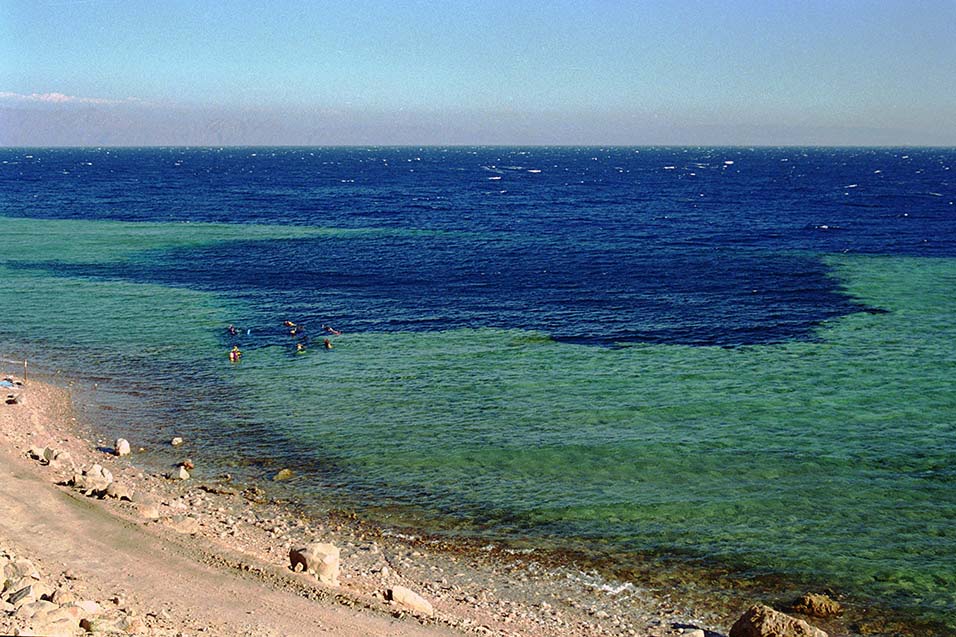
The Blue Hole is a beautiful place for people fond of scuba diving, free diving, and snorkeling. Here, you will find colorful and exotic types of fish. You might even spot ‘Nemo’ the clownfish swimming around!
Personally, one of the most amazing types of fish I ever witnessed while at the Blue Hole was the Lionfish. But be careful if you see one, as a sting from the lionfish can be extremely painful, if not fatal.
It’s also difficult to ignore the breathtaking coral reefs in Dahab which transport you to a completely different world.
Laguna
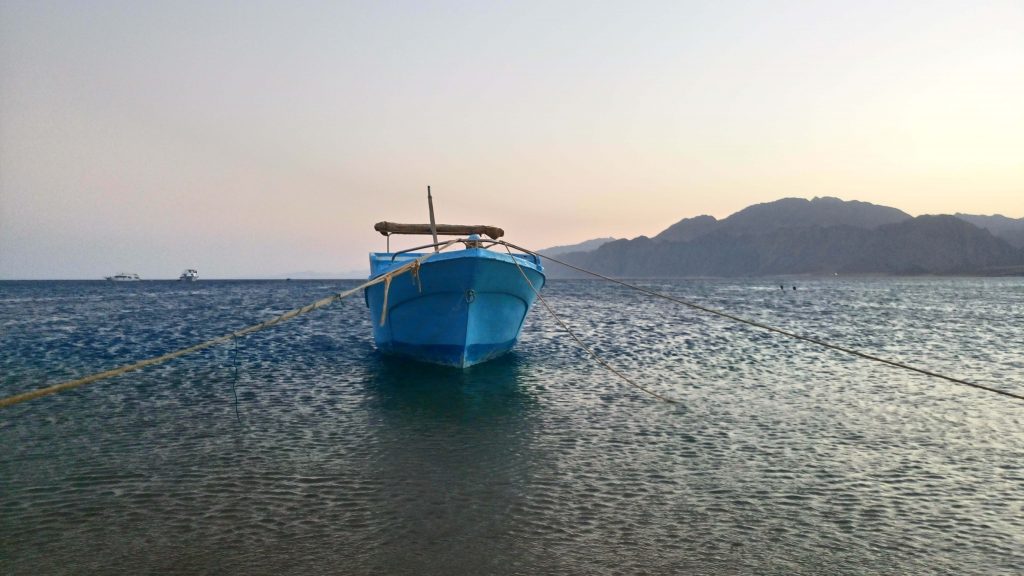
While not quite as amazing as the Blue Hole, Laguna is still beautiful. Here, coral reefs are not near the shore, requiring you to swim a little in order to see them. The place is also suitable for people who don’t like water activities. You can go there to relax and enjoy the excellent taste of Bedouin tea.
Light House
Light House
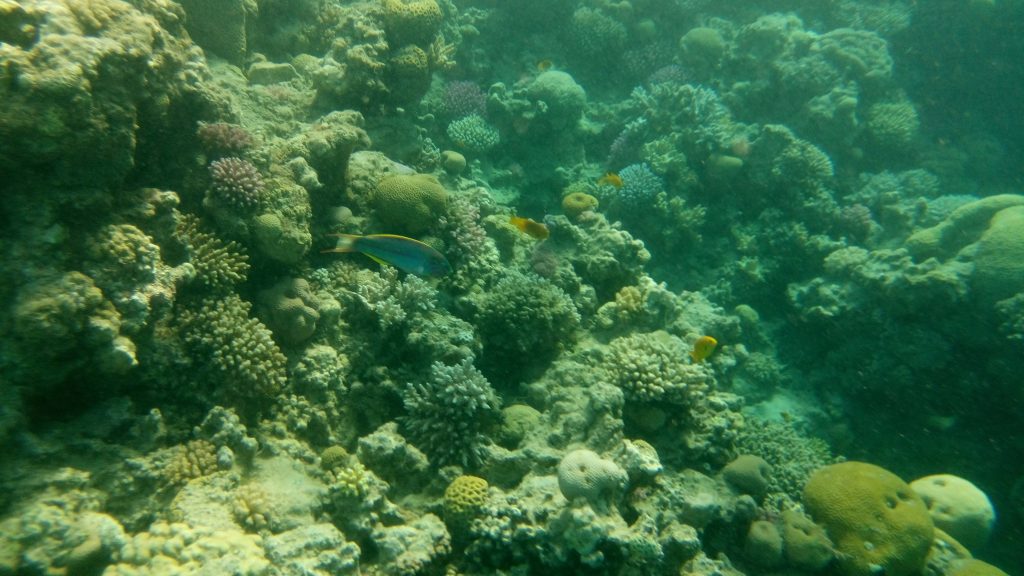
At Light House, you will be able to practice scuba diving and snorkeling. This place is perfect for anyone wanting to see some coral reefs as the reefs are close to the shore. The place is excellent and suitable for people who can’t swim because the coral is near to the shore, so you don’t have to swim to see the coral and the amazing fish. Also, for people who want to try diving for the first time, the Light House is suitable for them. Simply put, the place is easy to access and suitable for all types of water activities and for people with different skill levels.
The Canyon

Personally my favorite place, the Canyon offers a diverse range of fish and coral. This place is suitable for scuba diving and snorkeling.
I prefer this place because I saw different kinds of fish and corals there that I hadn’t see in any other place. Not only are the fish and corals distinct in this location, but also the diving is different as a result of it. The Canyon is a unique place to dive in and offers a different underwater experience.
Abu Galum
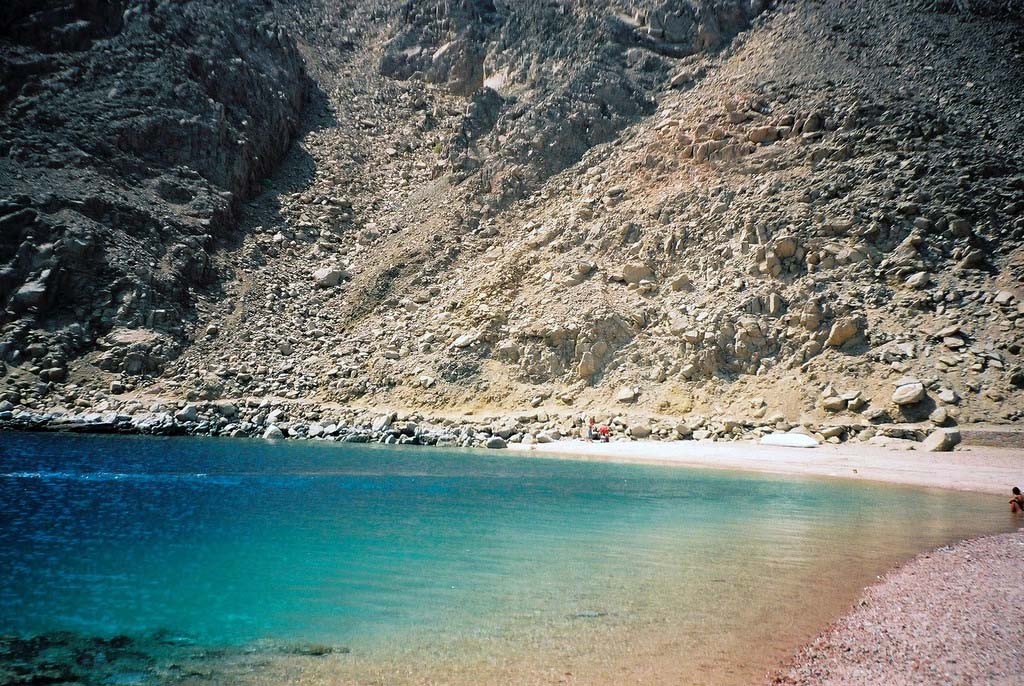
Abu Galum is a calm location you can visit by boat or camel. Located just 20 minutes from the Blue Hole, Abu Galum is great for snorkeling and scuba diving. Even better, you can enjoy tasty Bedouin delicacies here!
Blue Lagoon
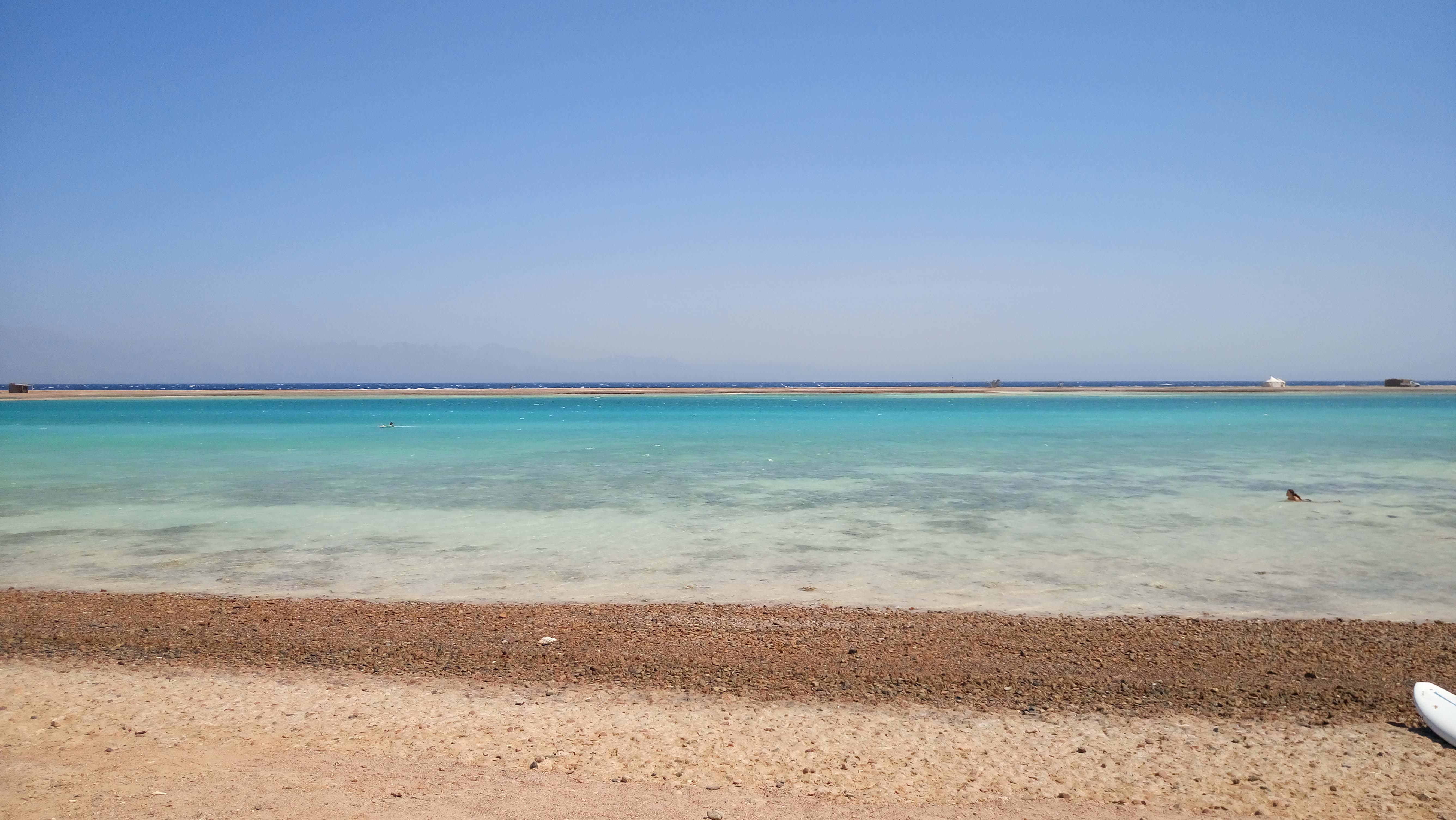
Blue Lagoon is one of the most calm and relaxed places in Dahab. Here you can enjoy Kitesurfing or simply soak up the sun while reading a book
12/02/2016
The rape of a dog in Egypt
The rape of a dog in Egypt
This's Anastasia, she used to live in front of my building in october .. Anastasia was extremely friendly. during the last months, the rest of her pack was shoot by gun by a stuid officer who lives close to me but i dont know him! (20+ dogs) 5 days ago she found her in pain, bleeding from behind with her nether area completely shredded. "Check the photos" we took to dr khaled ali and turns out she was RAPED! .. we had to make her a surgery as we also found a tumer which got bigger and had pus because of the raping! full hysterectomy and we removed the tumer but shes still on medications! after the surgery we took her to a kennel but she was so sad , cold, and scared so i couldnt keep her for long. I took her and i'm still looking for a place to take her of her for the first 2 3 weeks .. she needs a special care! and medical care! P.S. she didnt take any of her medications today so plz someone help me! I dont know how to clean wounds or give injects!
also i cant control her alone .. plz someone help me! I live in october and i dont have a place for her! someone can take her to her place but i have to find someone to help me transfer her! and give her her medications as well coz the girl also doesnt have anymedical experience or experience with dogs!
also i cant control her alone .. plz someone help me! I live in october and i dont have a place for her! someone can take her to her place but i have to find someone to help me transfer her! and give her her medications as well coz the girl also doesnt have anymedical experience or experience with dogs!
4/20/2016
Hoping for answers about blocks on internet calls, NGOs take telecom regulator to court
Hoping for answers about blocks on internet calls, NGOs take telecom regulator to court
A lawsuit scheduled to be heard Wednesday in the Administrative Court is hoping to force some answers. The suit, which was already postponed earlier this month, was filed against the NTRA by the NGOs Support Center for Information Technology and the Association for Freedom of Thought and Expression.
The lawsuit aims to force the NTRA to release a list of the services or websites that have been blocked in Egypt in recent month and to divulge the criteria upon which they were blocked, explains Aziza al-Taweel, the Support Center’s lawyer.
So far, Taweel says, the NTRA denies blocking WhatsApp and other voice calling services, but also maintains that such apps provide unlicensed international calls and are therefore illegal. “They are claiming that they need to be licensed first, while denying any blockage at the same time,” Taweel explains.
NTRA spokesperson Karim Soliman confirmed to Mada Masr that the regulatory body considers these services to be illegal, but added no further comments.
Did the NTRA block VoIP?
Questions about the NTRA’s stance on internet calls came to public attention in October 2015, when social media went into a rage after many users reported being unable to use internet calling apps like Viber, Skype, WhatsApp on 3G networks and ADSL. Disgruntled users’ reaction worsened after a few scattered statements by customer service operators of telecom companies on social media confirmed that the services had been blocked.
Shortly after, the services went back to working, with the usual poor quality on 3G networks. Both the telecom companies and the government regulator assured the public there was no blocking whatsoever.
Exactly what happened was, and remains, unclear. After nearly six months, there has been little clarification about the incident, highlighting the lack of transparency among the agencies responsible for enabling and regulating telecommunications in Egypt.
When Mada Masr investigated the issue in November 2015, Egypt’s Ministry of Communications and Information Technology deflected any questions about the government’s plans for internet voice calls. Ministry spokesperson Mariam Fayez said such matters are in the hands of the National Telecom Regulatory Authority. Fayez declined to answer direct questions about whether the government is considering blocking VoIP services. The ministry is only concerned with strategic work, she said.
Meanwhile, the NTRA’s official media office refused repeated requests for information. Ali Anis, the NTRA’s Societal Interaction Director, told Mada Masr the authority has not blocked any services so far, and is not planning to do so.
All three of Egypt’s mobile phone companies — Mobinil, Etisalat and Vodafone — also insisted they took no action to block VoIP applications, apart from Skype, which has been blocked on 3G networks since 2010. Any problems with other applications were due to individual mobile phones or the applications themselves, company representatives said.
Telecom Egypt, the country’s landline monopoly and a major internet service provider, also insisted it is not blocking any applications, but refused to answer any further questions.
One could almost believe reports of service outages were a series of strange coincidences magnified by social media, or perhaps a technical glitch that affected users on different mobile networks, using different applications on different devices. And yet, a few accounts dispute the official narrative.
Before and during the outage in October, customer service representatives on Twitter clearly stated that the NTRA gave orders to block VoIP services.
One NTRA representative also reportedly told a journalist for news site DotMsr.com that the agency had blocked VoIP — reports the NTRA later denied. This call, however, has been used in court by Taweel and the defense team as a proof.
An industry insider, who would only speak on condition of anonymity, also told Mada Masr the telecom companies did indeed block VoIP services, and on direct orders of the government.
Who does the NTRA work for?
Whether or not the NTRA is actually behind the block on VoIP applications, the episode raises questions about whose interests the regulator serves.
By law, the NTRA’s mandate is to protect users and their rights, a responsibility the agency is given in Article 2 of Egypt’s 2003 telecommunication regulation law. However, Article 4 of the telecommunications law requires the NTRA to protect “National Security and the state’s top interests.” Attempts to regulate the use of VoIP apps shows what happens when user rights and national security come into conflict.
“It is arguable that the NTRA is enforcing the ban on unlicensed trafficking of international calls, which is a crime according to Article 72 of the Telecom Act. However, it is also arguable that in enforcing this ban, the NTRA is also preventing users from making VoIP calls to other users in Egypt, even if those calls are routed internationally via the internet,” says independent researcher Amr Gharbeia.
One of the arguments against VoIP services is that, without cooperation from app developers, Egyptian authorities are unable to trace or monitor calls made over apps — unlike international or local phone calls made on landlines and mobile phone networks. This, opponents of the technology say, is a major security issue. “Legally speaking, if a crime occurred and you wanted to check call records of a suspect for example, they won’t agree. A famous examplehappened in Italy, where they tried to get records from the VoIP operators but they refused to even negotiate,” says Khaled Hegazy, external affairs and legal director at Vodafone Egypt.
Amr Gharbeia, an independent researcher, believes the telecom companies’ opposition to VoIP stems more from financial motivations than security concerns. Every free or low-cost call through VoIP apps takes money out of the phone companies’ pockets. This is especially true for lucrative international calls, all of which have to run through Telecom Egypt’s infrastructure, keeping rates high. “The reason for banning VoIP is all economic and is hardly a privacy or security issue. The telecoms want to keep the users paying higher fees for services they can get for much better prices or for free, so they are trying to monopolize the international calls market,” Gharbeia explains.
Vodafone, for example, has clearly expressed its desire to block VoIP, in particular WhatsApp’s voice calling feature. In March 2015, after WhatsApp's voice calling service was launched, Vodafone Egypt sent a letter to NTRA asking about the legality of blocking the service “for the negative impact it has on the telecom sector.” However, according to Hegazy, NTRA never replied.
Hegazy, says that the telecom sector in Egypt, and in particular Telecom Egypt, has been hurt by these applications, although he was not willing to quantify how companies are affected.
“Telecom Egypt is the main international gateway for Egypt, so any international call must go through it. I think they are the most negatively affected in terms of revenues,” he says. “We earn almost the same amount from international calls as we do in local ones, so we are not really affected,” he adds, speaking of his own company.
However, telecom companies’ financial disclosures appear to belie claims that VoIP services are seriously affecting the industry.
Despite a sharp drop in landline subscribers over the last five years, Telecom Egypt, announced a 360 percent increase in Q3 net profits for this year, reaching LE1.2 billion, while Q2 net profits increased by 55 percent. Vodafone Egypt revenues rose from LE6.4 billion in the first six months of 2014 to LE7.01 billion in the first half of 2015.
Even Mobinil, which incurred losses from 2012-2014, appeared to rebound in 2015, reporting a 5.3 percent increase in profits three quarters of the way into 2015. Etisalat Misr’s revenues grew by 2.6 percent by the end of 2014 as well.
Anis of the NTRA also dismisses the idea that VoIP apps are doing serious damage. “The financial impact of these applications in not big to begin with, and it affects the telecom companies, not the sector as a whole,” he says.
Ironically, phone companies don’t seem to have a problem with using VoIP services when it suits them. Expanding Egypt’s call center industry remains a hallmark of the country’s economic development strategy. Among the most prominent call center operators is Vodafone Egypt, which provides call center services for affiliates around the world, from the UK to New Zealand. These businesses would not be sustainable if operators had to pay international calling rates to route calls through the landline network. “Call centers in Egypt do use VoIP services. However, it is not illegal, they have obtained a license since they started operating in the country, because otherwise, no one will come here and firms will open its call centers in other countries like India,” an industry source says.
This presents another bind for the NTRA, and perhaps explains some of their ambiguity about VoIP. Any economic or security interests that would be served by blocking VoIP have to be balanced against the potential fallout of speaking too strongly against the technology.
Digital security researcher Ramy Raouf says officially blocking VoIP would have particularly bad repercussions for the digital economy. “If you block Viber for example, you will also block a number of advertisers alongside it, which will severely affect traffic levels and investment," he says. “In 2011, when the internet was blocked during the revolution, the economy lost a lot of money as a result.”
Uncertainty about the official reaction toward these applications is not reassuring for any investor trying to enter the market, since it gives a bad idea about the Egyptian market as a whole, says Mahmoud al-Banhawy, a digital freedoms officer at the Support for Information Technology Center.
Hegazy disagrees. “Blocking these service in Saudi Arabia and UAE did not scare potential investors, nor will it do so here,” he argues.
With such mixed messaging about VoIP, the role and real intentions of the sector’s regulator remain a mystery. The Communications Ministry deflected questions, as did the NTRA’s media office. Anis, the agency’s social interaction director, simply says the NTRA is currently studying the situation as a whole, in attempt to reach a compromise among competing interests. "We are only trying to set some determinants," he says. Customers, meanwhile, are left wondering where their rights fall into the equation, and waiting to see if VoIP apps are blocked overnight — a situation Wednesday’s lawsuit hopes to change.
الاشتراك في:
التعليقات (Atom)
